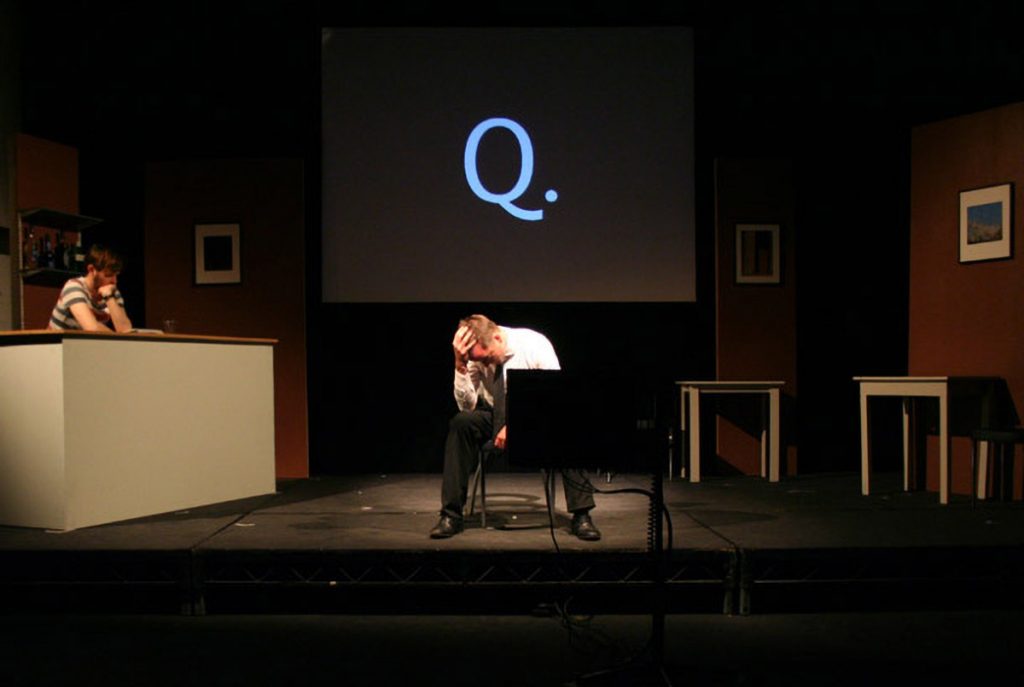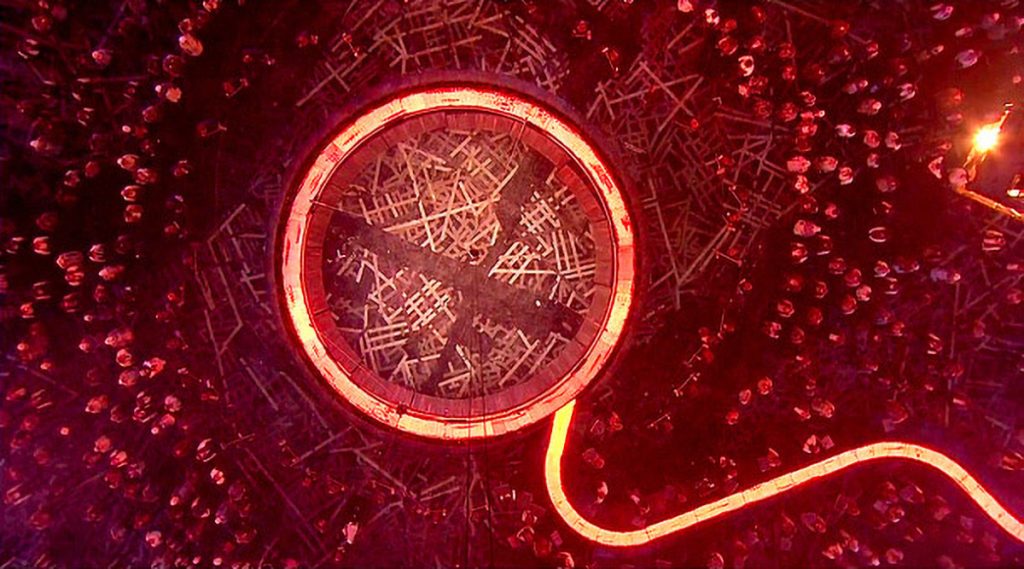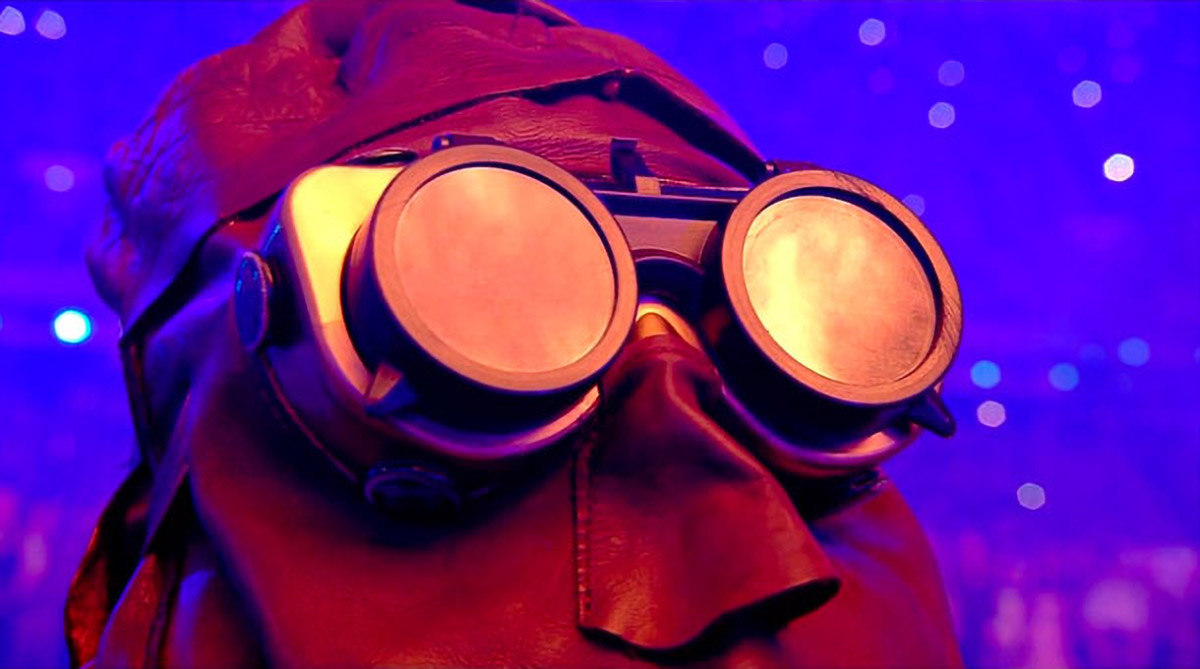As this inclement and balmy London summer draws to a close, the ICA plays host to Brief Interviews With Hideous Men, David Foster Wallace’s darkly comic collection of short stories, adapted for stage by artists Andy Holden and David Raymond Conroy. Penned in the late 90s, Wallace’s text employs a variety of literary techniques to recount tales of broken relationships, sexual frustration, depression, perversion and violence. Among them, a series of interviews with the eponymous male subjects sees the questioner’s voice rendered mute, replaced and reduced simply to an intermittent letter Q. Four of these interviews have been selected here, with Holden and Conroy’s staging introducing a number of additional devices, such as autocues, earpieces and overhead projections.
Acting as a prologue is Forever Overheard, a second-person narrative that takes place on the occasion of a boy’s thirteenth birthday. It recalls, in achingly intricate detail, the sights, sounds, smells and innermost thoughts of the young protagonist as he ascends a high diving board for the first time, and ultimately takes the symbolic plunge into the adult world below. As with all the acts to follow, the story is read verbatim, but here its evocative and sensual rhythm is countered by the brisk cadences of the unseen narrator (Holden himself), who dispatches the text as if a reluctant high school public speaking assignment. The narration is accompanied by a video projection of the pool’s blue, undulating ripples, and by the sound of gently throbbing looped guitars, provided by the band, The Grubby Mitts. The musicians appear serious and immersed, with an almost clichéd adolescent earnestness. Once the performance is over, they scamper silently off stage in a somewhat comedic scramble, collecting their instruments and paraphernalia as they go. Is the overall effect here intentional? Are these performances sincere, or are we in the realm of parody? Could we be experiencing both at once?
Earlier this year, Conroy curated a group exhibition at Seventeen Gallery, A Plea For Tenderness, whose stated aim was to “illuminate the space that exists between sincerity and irony.” Similarly, Holden’s contribution to that same show took the form of a manifesto entitled MI!MS (Maximum Irony! Maximum Sincerity). Thus, it should come as no surprise that we find ourselves here on uncertain ground. With this in mind, we meet the interviewees…
First, we are placed in the midst of a breakup, with subject #11 (played by Joey Bones) standing front of stage, bags packed at his feet, addressing the audience as if we were the other person in the relationship. He begins to explain why he is leaving us/her; that it all boils down to the fact that he can no longer bear her constant fear of him suddenly leaving. Well, it turns out, she had been right to worry. A solitary letter Q is sporadically projected onstage, interrupting the man’s monologue. Though the words for which it stands remain unheard, the staging has the effect of making this Q a surrogate for the unspoken questions of the audience, as we imagine our own responses to the man’s perverse reasoning. He is as torn up about all this as her, he claims, but we don’t really buy it. We empathise with her inevitable hurt, seeing the man’s cowardice, yet at the more ridiculous junctures, we find ourselves laughing at the situation for its twisted logic. We find truth and farce in equal measure: maximum irony, maximum sincerity.

Two of the following acts mirror each other in their recollections of tales of sexual violence. The first, a harrowing (but hypothetical) account of a gang rape, describes in gory detail the most heinous acts of violation and degradation that any one person might endure. The interviewee (Matthew Duggan) cynically argues that such an experience retains a sort of value to the victim, a revelation or life lesson that offers them a window onto the true, dark side of humanity. His argument is so misguided that (with Wallace here perhaps invoking Godwin’s Law) it descends into the realm of Nazi analogy, citing Victor Frankl’s survivor’s account:
“Was the Holocaust a good thing? No way. Does anybody think it was good it happened? No way. But did you ever read Victor Frankl? Victor Frankl’s Man’s Search for Meaning? It’s a great, great book.”
Later, we find ourselves in a bar with a schmoozy yuppie type (Gwynfor Jones), who buys round after round of beer, whilst recounting a one-night stand he had with a girl: a post-hippie, new age “Granola Cruncher.” He tells of how, during their post-coital chitchat, she revealed to him that whilst hitchhiking once, she had gotten into the wrong car, and found herself being taken at knifepoint to a secluded area and raped. Somehow, however, she was apparently able to attain a kind of spiritual control of the situation. As the yuppie’s retelling comes to a close, he confesses that, at that moment, he had been deeply moved and fell in love with this girl. There is a sincerity and tenderness to his lengthy account, and a degree of detail that seems almost beyond fabrication. All the while, however, we are aware that he may in fact be spinning a yarn in order to manipulate the interviewer’s sympathies, and ultimately make her another notch on his bedpost.
Stealing the show is interviewee #59, a gown-clad, middle-aged German (Justin Segal), who perches at his psychiatric hospital bedside, recalling his descent into madness. We learn of his teenage masturbation fantasy, which takes place in the State Exercise Facility of a remote Siberian military outpost to which his father, a brilliant mathematician, had been posted. Inspired by the US sitcom Bewitched, in his fantasy he has the supernatural power to halt time with a single gesture of his hand, freezing all the occupants of the gymnasium in suspended animation, save for himself and the chosen woman of his desire. With this same gesture, the woman would be instantaneously drawn towards him, overpowered with erotic attraction, leading the frenzied copulation to commence. However, the young man’s overly analytical mind finds this scenario more and more problematic, for he realises he has failed to take into account the discrepancies between the stasis of the room and the continuing flow of time beyond its walls. What if someone were to walk in?! He thus feels compelled to expand his imagined powers so that he may freeze time in the whole state, the country, the planet, the galaxy, the entire universe. Soon, he is gathering data and making the necessary astronomical calculations in order to command the trajectories of all the implicated celestial bodies, to retain some kind of consistent model of reality. His masturbation sessions rapidly spiral out of control, leaving him increasingly unable to achieve any kind of sexual gratification, the escalating hours of intense mental exertion taking their toll:
“it was then I broke down from it. The fantasy’s single gesture of one adolescent hand had proven to entail an infinitely complex responsibility more befitting of a God than a mere boy. These broke me. It was at this moment I renounced, resigned, became again merely a sickly and unconfident youth.”
This Borgesian tale embodies the dominant theme of the work as a whole: the truth of a paralysingly over-analytical self-consciousness that acts to hinder genuine human connection. Wallace’s stories are often accompanied by a swarm of metatextual footnotes, which invade the page and usurp the main text, hampering narrative progression. At its core, however, the work reads as a plea for sincerity. Like so many of his characters, Wallace himself appears desperate to move on, to break free from his postmodern shackles.
Although published just over a decade ago, Brief Interviews already has the feel of a period piece; an example of late-90s high-baroque postmodernism, bound by the weight of its ornate metanarrative structures and entwined literary devices. Yet, it also seems to attempt to instigate a transitionary moment, to act as a post-postmodern watershed. Looking back through the lens of the present, it is as if Wallace (who would later, tragically succumb to suicide) has seen his own fate, and is frantically trying to renounce the responsibility of the author as a God, to instead experience the reality of a lived passion — whilst at the same time, he continues to strive to write that “great, great book.”
In Holden and Conroy’s production, the audience is made aware of the play’s artifice, with actors fed their lines in various ways throughout the performance. One wears an earpiece, whilst another reads off an autocue, and at one point, an offstage prompter leaps into action when it appears that an actor might have lost his place. These interventions echo the multi-layered nature of Wallace’s writing, which the artists hope will lead the audience to experience “a kind of oscillation, or simultaneity between being absorbed in the text and being aware of how it functions.” Yet, in a pivotal passage of the book (one of the aforementioned footnotes, although not part of the production here), Wallace renounces this very tactic:
…with the now-tired S.O.P. ‘meta’-stuff it’s more the dramatist himself coming onstage from the wings and reminding you that what’s going on is artificial and that the artificer is him (the dramatist) and but that he’s at least respectful enough of you as reader/audience to be honest about the fact that he’s back there pulling the strings, an ‘honesty’ which personally you’ve always had the feeling is actually a highly rhetorical sham-honesty that’s designed to get you to like him and approve of him (i.e., of the ‘meta’-type writer) and feel flattered that he apparently thinks you’re enough of a grownup to handle being reminded that what you’re in the middle of is artificial (like you didn’t know that already, like you needed to be reminded of it over and over again as if you were a myopic child who couldn’t see what was right in front of you), which more than anything seems to resemble the type of real-world person who tries to manipulate you into liking him by making a big deal of how open and honest and unmanipulative he’s being all the time, a type who’s even more irritating than the sort of person who tries to manipulate you by just flat-out lying to you, since at least the latter isn’t constantly congratulating himself for not doing precisely what the self-congratulation itself ends up doing, viz. not interrogating you or have any sort of interchange or even really talking to you but rather just performing in some highly self-conscious and manipulative way.[i]
In both incarnations, Brief Interviews is a display of brutal honesty and insight, which bravely explores this kind of ultimately destructive sincerity and self-loathing. Whilst the distinct lack of optimism here is sometimes difficult to stomach, the wicked humour and profound, provocative truthfulness frequently succeed in propelling matters beyond the postmodern miasma.

By contrast, in recent weeks London has been caught up in a wave of unbridled optimism, enthusiasm and community spirit. The build-up to this summer’s Olympics had been blighted by the usual scandals: the G4S private security fiasco, online ticketing problems, tales of sponsors’ corporate greed — not to mention the abysmal summer weather — all reported in the press ad nauseum. This kind of grumbling is, after all, a British national pastime. However, from the moment the Olympic Stadium lit up with Danny Boyle’s idiosyncratic vision of an opening ceremony, it was as if the nation suddenly made a collective decision to go with it, to curb their cynicism and embrace the games. And, as we witnessed the sight of those dark satanic, inflatable mills rising from England’s green and pleasant land, for reasons we could not entirely pinpoint, tears began to well in the eyes of even the most hardened of Londoners. It was as if Brunel and his cast of top-hatted industrialists had managed to encapsulate all the entangled wonder and ugliness of these isles, and we had awakened to the strange, simultaneous sensation of melancholia and pride.
The games themselves were a huge success, as we were treated to day after day of spectacular sporting triumphs and impeccable organisation, helped along by the enthusiasm of the tens of thousands of volunteer ‘Games Makers’. Above all else, it was the character of the competitors themselves that shone through most brightly: the joy of Mo Farah’s ‘Mobot’ celebration; the irrepressible speed and charisma of Usain Bolt; the expression of Bernini-esque ecstasy on Jessica Ennis’s face as she crossed the finish line. These new heroes and heroines captured the public imagination, their down-to-earth ebullience seeming a million miles from the world of the overpaid, underachieving Premiership footballers whose obnoxious antics we had become so weary of.
London was now, it seemed, hosting a party for the entire planet, a celebration of all of humanity. Nonetheless, of course, the world continued to be a hideous place for many, with news of the Assad regime’s atrocities in Syria relegated from our nightly news screens in favour of analysis of the latest medal table fluctuations. Then again, perhaps we’d already realised that we’re smart enough, aided by technology, to figure out what’s really going on in the world; that we no longer depend on the mainstream media to guide our way. In the US, Olympic broadcaster NBC was lambasted for editing out a poignant tribute to the 7/7 London bombings during the opening ceremony, claiming it wasn’t “tailored for the U.S. audience.” Viewers flocked to the social networks to voice their outrage, and to seek out alternative ways to watch uninterrupted coverage via global online streams. This was another nail in the coffin for television’s monopolistic modus operandi.
Once the Olympics had ended, the British public’s appetite for more of the same was further whetted by Channel 4’s trailer for the Paralympics. Meet The Superhumans provided what is possibly the most scintillating, exuberant, and just plain downright cool minute-and-a-half of television there has ever been, accompanied by a duly upbeat track by Public Enemy (the same group who, ironically enough, had once urged us not to believe the hype). The competitors lived up to their billing, with feats of athleticism that matched, and even surpassed, those of their able-bodied counterparts. As London 2012 became the first sold out Paralympics in history, we began to stop viewing these competitors as having a disability, instead seeing them as simply differently-abled elite athletes. Knowledge of high tech carbon fibre prosthetic blades and esoteric Paralympic categorisations became assimilated into the obscure vocabulary of the avid sports fan, who, over the course of the summer, had learned to tell their S3 from their T44, their madison from their kierin, their piaffe from their repechage. It was, after all, all rather arbitrary, but utterly compelling stuff.
David Foster Wallace’s hideous men, by comparison, are frequently characterised by displays of cynical and exploitative behaviour. One particularly loathsome individual refers to his own deformed limb as “the Asset”, using it to manipulate countless sympathetic women into sleeping with him. At these games, however, we found endless inspiring tales of human triumph over adversity. Take, for example, the story of former Formula One and Indycar driver, Alex Zanardi, who in 2001 lost both his legs in a horrific and violent high-speed crash: “The car broke into two pieces, one bit of me stayed with the car and the other bit, which was my legs, went ‘arrivederci’ in the other direction. And that’s how I won the tickets to London 2012,” he says with a wry laugh.[ii] Following years of rehabilitation and training, during which time he even designed his own innovative prosthetic legs, Zanardi capped his remarkable story by becoming a double Paralympic handcycling champion at the age of 45.
It’s easy to come over sounding all ‘New Sincerity’ here, lauding Zanardi in the same way that Jesse Thorn extolled the virtues of Evel Knievel in his post-ironic manifesto. However, Knievel’s cartoonish feats and kitsch star-spangled jumpsuit were all for show, appealing to our inner child’s sense of awe. Zanardi, on the other hand, doesn’t appear to have a cynical bone in his body. As a man, he remains grounded and very definitely in touch with reality, carrying himself with an infectious enthusiasm and ever-present smile. His is an awesomeness that genuinely can, as per the slogan of the games, “inspire a generation.”
So, will all this newfound sincerity last, or is it just a flash in the pan? Might we instead be in the midst of a broader oscillation that has seen London’s mood swing from the apocalyptic scenes of last August’s riots, to the displays of unity and exuberance 12 months on? There is certainly a burning desire for the life-affirming positivity of this summer to continue. As Seb Coe reminded us in his closing speech, London has in recent years seen the worst of mankind: now it has witnessed the best. In a grand manner that David Foster Wallace’s plea for sincerity could never have hoped to emulate, perhaps the Games truly were a game changer. The future only knows.
[i] Wallace, David Foster. Brief Interviews With Hideous Men. London: Abacus, 2001. p. 125.
[ii]Rose, Michael. True Grit – Zanardi Heads to Paralympics. Reuters, 25 May 2012.
1st and 3rd images: the 2012 Olympic Opening Ceremony, from the IOC YouTube channel.
Middle image courtesy of Andy Holden.


